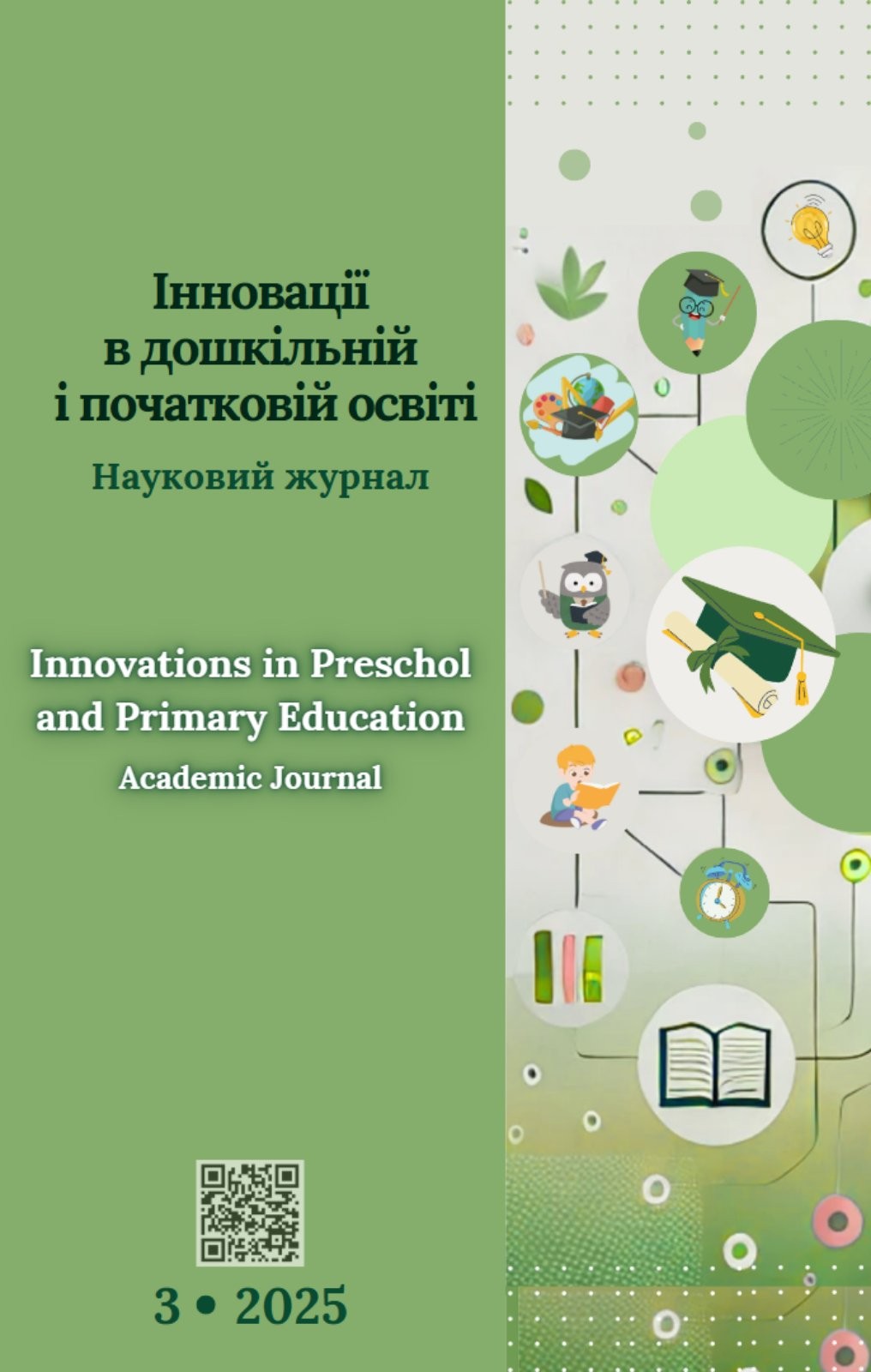Diagnosis of the formation of environmental competences of future teachers in the context of a European approach
Keywords:
environmental competence, future teachers, Erasmus+ project, diagnosis of environmental competenceAbstract
The article is devoted to the analysis of the problem of diagnosing the formation of environmental competence of future teachers. Environmental competence of future primary school teachers is considered as an integrated personal characteristic that combines comprehensive knowledge of environmental disciplines, practical skills and abilities of humane behavior in the environment, value attitude and perception of nature, experience in environmental activities. The article emphasizes that the formation of environmental competence of a modern teacher requires pedagogical support based on a combination of national and European experience. The article provides a thorough theoretical analysis of the concept of "environmental competence", presents scientific views of scientists from Ukraine and the European Union. In the course of the study, criteria (motivational and value-based, cognitive and worldview, operational and activity-based, reflective and evaluative), indicators and levels (initial, intermediate, sufficient, high) of environmental competence formation of future teachers were identified. A diagnostic tool for determining the levels of environmental competence was proposed. The study was conducted on the basis of Vinnytsia Mykhailo Kotsiubynskyi State Pedagogical University, with the participation of first-year bachelor's degree students of control and experimental groups. The obtained results showed that the indicators of the experimental group, which attended a one-year elective course of the international project Erasmus + 101085524 – EcoEdEU – ERASMUS-JMO-2022-HEI-TCH-RSCH "Ecological education of preschool and primary school children: a European approach", are higher and better than the indicators of the control group, which studied according to the standard educational program. In addition, the article proposes a number of methodological recommendations based on European practices, including: interdisciplinary integration, use of eco-platforms, organization of environmental events, implementation of art therapy and media education tools, development of environmental emotionality. The article allows us to deepen our understanding of the peculiarities of environmental competence of future teachers and ways to diagnose it.References
1. Ministry of Education and Science of Ukraine. Derzhavnyi standart vyshchoi osvity za spetsialnistiu 013 «Pochatkova osvita» dlia pershoho (bakalavrskoho) rivnia [State Standard of Higher Education in the Specialty 013 «Primary Education» for the First (Bachelor's) Level]. Retrieved from https://surl.lu/ggwcso [in Ukrainian].
2. Verkhovna Rada of Ukraine. (2017). Zakon Ukrainy «Pro osvitu» [Law of Ukraine «On Education»]. Vidomosti Verkhovnoi Rady Ukrainy, 38-39. Retrieved from https://zakon.rada.gov.ua/laws/show/2145-19#Text [in Ukrainian].
3. Kazmirchuk, N., Karuk, I., & Stakhova, I. (2024). Innovatsiini tekhnolohii formuvannia ekolohichnoi kultury: yevropeiskyi tezaurus [Innovative technologies for the formation of environmental culture: A European thesaurus]. Nauka i tekhnika sohodni, 6(24), 471-482. [in Ukrainian].
4. Karuk, I., & Stakhova, I. (2024). Analiz yevropeiskoho prohramno-metodychnoho zabezpechennia ekolohichnoho vykhovannia ditei doshkilnoho viku [Analysis of the European programme and methodological support for environmental education of preschool children]. Suspilstvo ta natsionalni interesy, 5, 241-250. [in Ukrainian].
5. Ecological education of preschool and primary school children: a European approach. Retrieved from https://ecoedeu.vspu.edu.ua/ [in English].
6. European Commission. EU Learning Corner. Retrieved from https://learning-corner.learning.europa.eu/index_en [in English].
7. European Commission. European Green Deal. Retrieved from https://surl.lu/cagxsq [in English].
8. Forstner-Ebhart, A. (2002). Best practice an zertifizierten Umweltschulen [Best practices in certified environmental schools]. Paper presented at the Forschungsforum der österreichischen Pädagogischen Hochschulen, 2002. № 8. P.123. [in German].
9. Foundation for Environmental Education (FEE). Retrieved from https://www.fee.global/ [in English].
10. Hanke, M., Paseka, A., & Sprenger, S. (2023). Understanding the meaning of uncertainty in geography education: a systematic review. Teachers and Teaching, 1, 1-27. Retrieved from https://surl.li/lwcgjy [in English].
11. Rannikmäe, M., Holbrook, J., & Soobard, R. (2025). Social constructivism – Jerome Bruner. In Science education in theory and practice. №21. Р. 255-273). [in English].
12. Resolution of the Council of Ministers. Retrieved from https://www.ciencia-aberta.pt/resolution [in English].
13. Schmidt, S. (2005). Universals in the content and structure of values: Theoretical advances and empirical tests in 20 countries. Advances in Experimental Social Psychology, 25, 1-65. https://doi.org/10.1016/S0065-2601(08)60281-6 [in English].
14. Shepardson, D., Wee, B., Priddy, M., & Harbor, J. (2007). Students’ mental models of the environment. Journal of Research in Science Teaching, 44(2), 327-348. https://doi.org/10.1002/tea.20161 [in English].
15. Theobald, M., Danby, S., Einarsdóttir, J., Bourne, J., Jones, D., Ross, S., Knaggs, H., & Carter Jones, C. (2015). Children’s perspectives of play and learning for educational practice. Education Sciences, 5(4), 345-362. https://doi.org/10.3390/educsci5040345 [in English].
16. European Commission. What is the Green Competences Framework?. Retrieved from https://surl.lu/buhdnb [in English].

